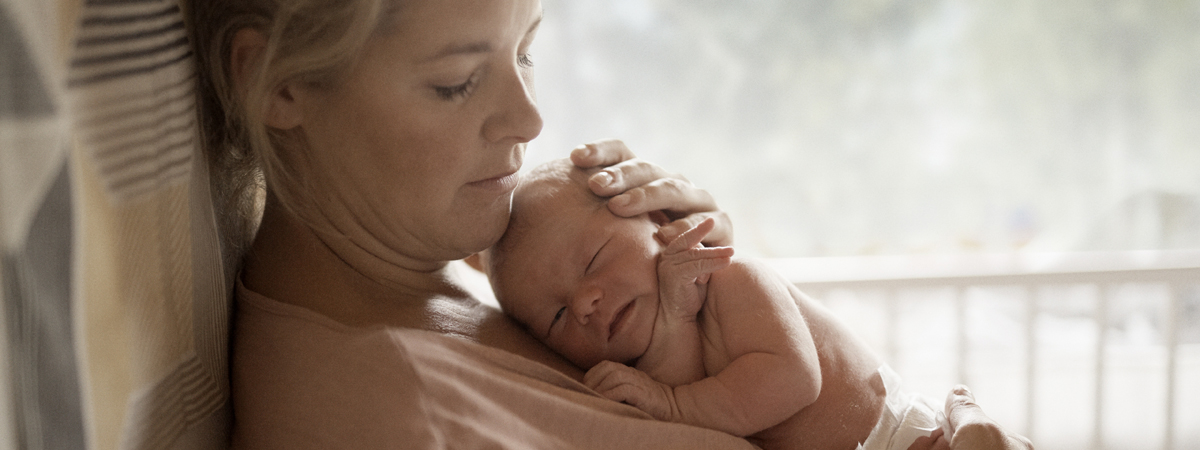Baby blues after giving birth
You’ve just come home from the hospital with a brand-new baby in your arms – life should feel wonderful. So why do you feel so low and sad? Learn more about what the baby blues are all about and when they will pass.
After so many months of waiting, you finally get to meet your new baby. But maybe you just feel like crying, despite the fact that this is supposed to be the happiest time of your life. Well, it may help to know that this is an incredibly common reaction: more than half of all new mothers are affected by the baby blues.
What are the baby blues?
The baby blues arrive a few days after giving birth. The intensity may vary: some people might feel just a little low, while others might feel quite depressed, as if the mother of all PMS had arrived. And it isn’t necessarily crying; how the baby blues manifest will differ from person to person. Maybe you feel endlessly irritated with a partner, or generally misunderstood. You may also have the most bizarre and uncomfortable thoughts, like disappointment or regret about the baby, and doubting your ability to be a good parent.
Not identifying with that ‘happy baby bubble’ can be stressful, but be aware that this reaction is common. Becoming a parent is a process and it can be painful when your heart grows. It’s also completely fine to not love this earliest time – because it’s not exactly a picnic. And if that immediate, unlimited love for your baby – which you hear so many others talk about – hasn’t quite kicked in yet, that doesn’t mean there’s anything wrong. It simply takes different amounts of time for different people to settle in. But trust us: this love will come.
You’re dealing with a major life adjustment and anxious thoughts and feelings right now. There is also a clear physical explanation for what is going on.
Haunted by hormones – again
You’ve surely heard it before – but this condition, too, is actually due largely to hormones. The hormones that were essential for the baby’s development during pregnancy are now subsiding after giving birth. In addition to adjusting to your new role as a parent, this sudden hormonal change is likely occurring in concert with a huge sleep deficit, which can lead to anxiety, depression and contradictory feelings after giving birth. If you take a step back and try to consider the big picture of everything going on right now, it isn’t so surprising that things feel upside down.
What can you do?
Perhaps the most important thing you can do is to try to relax into this state and know there is nothing strange about what’s happening. In fact, for most people, this earliest period of time is far from Instagram-perfect. Try to take care of yourself in a way that makes you feel better and trust that you’re going to adapt to your new role soon. If you know other new parents, it can help to talk to others who are going through the same thing. And fresh air is often a mood-booster. When you’ve just given birth, long walks might not be at the top of your wish list, but it still tends to help to get out for a stroll every day
If you have a partner, you can suggest that they read up on the baby blues, which may be helpful if it’s hard to put your feelings and what you’re going through into words. As a partner, just remember that the most important thing is often simply being there to provide emotional support during this time, so that you can feel a mutual sense of closeness. When you’re in a relationship, it’s fairly common to influence one another’s emotional states, and the partner who didn’t give birth might actually have a bit of the baby blues as well. These first few days and weeks with a baby are tumultuous for everyone! But if your depression is affecting your whole life – for example if you’re struggling to get up in the morning – you shouldn’t wait for it to pass. Talk to your healthcare provider and get some help.
When do the baby blues pass?
The baby blues always pass and after a few weeks, they should subside. Of course, this is bearing in mind that you’ve just become a parent and you have to try to adapt to that new identity. In all likelihood, your emotional register has also changed – possibly forever. Fussing over things that never used to trouble you might just be part of who you are now. But an extended period of depression isn’t something you should tolerate – and sometimes it doesn’t pass. You might be experiencing postpartum depression and you will need help to handle that. It might be a good idea to have your thyroid checked, as it’s actually quite common for pregnancy and childbirth to impact how much thyroid hormone you form, and too little can lead to depression.
Your doctor or midwife will most likely catch and follow up on how new parents are doing, but you can also contact them if you or your partner need help. Then they can refer you to a psychologist or doctor.
It could also be the case that there is a clear reason for your sadness. Maybe the delivery didn’t go the way you thought it would, or maybe you are unable to breastfeed but you really wish you could. Rumination of any kind can be especially difficult when you’re experiencing the baby blues, but sometimes, you might need help with breaking a thought pattern before you can start looking ahead. Here too, it’s a good idea to turn to your healthcare provider as a first step.
Please note that all information above is based on Swedish recommendations.

